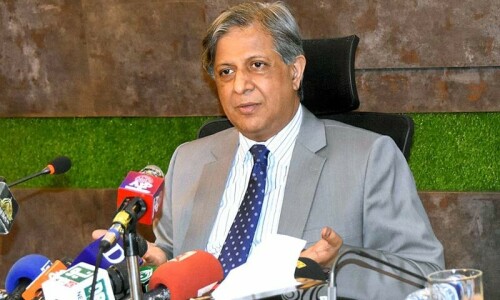WASHINGTON: The US State Department emphasised on Wednesday that the formation of a coalition government in Pakistan aligned with the British parliamentary system, asserting that efforts in this regard remain an internal matter for the country.
Responding to a question about the efforts in Pakistan to form a coalition excluding the PTI, spokesperson Matthew Miller said: “That is ultimately an internal matter, you see this in a number of countries that have parliamentary system of government where no party has established a majority. You see the kind of coalition that are formed.”
The United States, he said, could not take position on this because “ultimately that is not the decision for the US to make, its the decision for Pakistan to make.”
Responding to another question about alleged irregularities in the Feb. 8 elections, Mr Miller said: “We have called for those allegations to be investigated, we think that’s the appropriate step to take.”
But the US official also endorsed the elections, saying: “It’s clear that the elections in Pakistan were competitive and we look forward to working with the government, once it’s formed, that the people of Pakistan elected.”
In a Tuesday news briefing, White House Press Secretary Karine Jean-Pierre had said that President Joe Biden was aware of the fact that independent candidates won a majority of seats in Pakistan’s elections.
Meanwhile, the US Council on Foreign Relations (CFR) warned on Wednesday that without the full participation of the Pakistan Peoples Party (PPP), the country’s proposed coalition government may collapse within months.
The influential Washington think tank also underscored the enormity of challenges facing Pakistan, including severe economic problems, energy shortages, negotiations with the International Monetary Fund (IMF), ongoing terrorism threats, and spillover from Afghanistan.
It cautioned that a weak coalition would be ill-equipped to address these issues, leading to growing public unrest against the establishment and the government.
Separately, a report by the International Consortium of Investigative Journalists (ICIJ), highlighted that the contentious nature of these polls, marked by allegations of rigging and political uncertainty, were unlikely to bring stability to the nation of over 240 million.
Shuja Nawaz, the founding director of the Atlantic Council’s South Asia Centre, expressed optimism in the ICIJ report about the election.
Published in Dawn, February 15th, 2024















































Dear visitor, the comments section is undergoing an overhaul and will return soon.